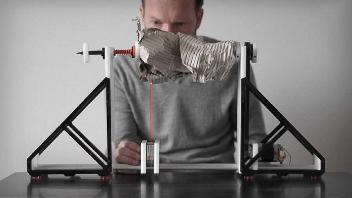A non-contact laser triangulation sensor from Micro-Epsilon is helping a German University to create musical melodies and rhythms by scanning the shape of everyday objects.
University of the Arts Bremen (Hochschule für Künste Bremen) is using Micro-Epsilon’s optoNCDT laser triangulation sensor to develop a unique musical instrument. This instrument consists of a rotation mechanism and the optoNCDT laser triangulation sensor. Everyday objects are clamped into the device and revolve around their axis. The laser sensor then scans the shape of these objects as they rotate. The distance measurement data from the sensor is then translated into acoustic frequencies and output via loudspeakers.
The instrument can ‘play’ a wide variety of everyday objects, whose silhouettes directly determine the melody and rhythm. As Professor Dennis Paul from University of the Arts Bremen explains: “Playing this instrument requires a mixture of practice, intuition and coincidence.”
 Non-contact laser triangulation sensor from Micro-Epsilon.
Non-contact laser triangulation sensor from Micro-Epsilon.
Micro-Epsilon’s optoNCDT series of laser triangulation sensors are normally used by industrial plants for non-contact distance, displacement, profile and position measurement tasks. Laser triangulation is based on a geometric triangular relationship: a laser diode projects a visible point of light onto the surface of the object being measured.
The back scattered light reflected from this point is then projected onto a CCD array by a high quality optical lens system. This forms a triangle between laser diode, measurement spot on the target object’s surface and the CCD array. If the target changes position with respect to the sensor, the movement of the reflected light is projected on the CCD array and analysed to output the exact position of the target. The measurements are processed digitally in the integral controller and then converted into a scaled output via analogue (I/U) and digital interface RS232, RS422, USB or Ethernet.
Micro-Epsilon is a major global manufacturer of sensors, headquartered in Germany. The company’s range of displacement sensors measure everything from to distance, position, vibration, dimensions and thickness, using both contact and non-contact measurement techniques.
These techniques include 1D, 2D and even 3D laser-optical sensors and systems, eddy-current, capacitive, LVDT & inductive, potentiometric and draw-wire principles. Additionally Micro Epsilon has developed its own range of non-contact infrared temperature sensors that can measure virtually any target temperature from -40 to +3,300°C. The company also manufactures a comprehensive range of colour recognition sensors.
With more than 40 years’ experience in the industry, Micro-Epsilon isn’t just a sensor manufacturer. The company is highly innovative and understands the importance of providing complete solutions and support services for its customers. The firm is renowned for its expertise in consulting, development and application of industrial sensors to complex, customer-specific solutions for measurement, inspection and automation. The focus is on selling technical advantage to its customers.